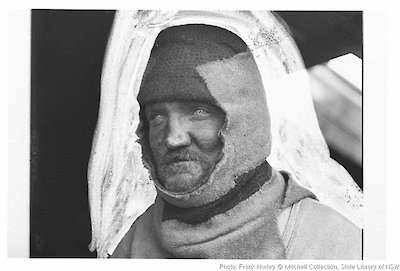Archibald Lang McLean
AAE position: Chief medical officer, bacteriologist
In their own words
A cold beauty picture. The penguins and seals do not revivify it, yet it appeals to one — the very best in one. Surely it is Perfection portrayed — Truth defined in rigidity of outline, simplicity of colours, in an atmosphere clear and uncontaminated.
— McLean diary, entry for 21 January 1914
Combining a strong interest in the written word with his other love, medicine, Archibald Lang (‘Archie’) McLean was recognised by the men of AAE for his ability to nurture both body and mind. A graduate in arts and medicine from the University of Sydney, McLean was 26 when he accepted the position of chief medical officer at Cape Denison.
Throughout 1912 he practised academic as well as practical medicine. His observations in bacteriology and human physiology included study of changes in the blood and the general health of his fellow-expeditioners through their cold, dark Antarctic winter. His work included monthly blood smears and ear, nose, and skin swabs from his colleagues, and the study of opsonins — protein fragments in blood that help keep invading organisms at bay. His blood and bacterial studies remain models of well-planned and executed Antarctic medical research.
McLean took part in a sledging journey along the eastern coast in the summer of 1912–1913, but his biggest adventures were to come. With the Far Eastern Party of Mawson, Mertz and Ninnis overdue, Aurora’s Captain Davis asked McLean to stay on for another year. It was fortunate for Mawson, the sole survivor of the disastrous sledge journey, that he did so. Through the long winter McLean nursed Mawson from near death back to full health.
Besides medical care, biological studies and carrying ice for water, McLean’s second year duties — in keeping with his literary bent — included editorship of the ‘Adélie Blizzard’. This monthly journal, laboriously hand-copied, recorded the lives of the seven men for seven months, with contributions invited in the form of verse, original articles, letters and imaginative writing ‘on every subject but the wind’, as Mawson later recalled. The Blizzard was to become one of the classics of Antarctic writing, alongside the South Polar Times and Aurora Australis. McLean, said Mawson, was ‘admitted by wireless to the Journalists’ Association (Sydney).’
With the group’s return to Australia in 1914, McLean accompanied Mawson to England, undertaking to help Mawson work toward publication of the AAE’s scientific work and with the writing of The Home of the Blizzard. They were there only a few months when war broke out. McLean went to France to work as a doctor, but was invalided with appendicitis, and returned to Australia. On his return he served as a medical officer on the Beelbangera Red Cross farm (NSW) and helped write a medical history of World War I But his many-faceted life was cut short by tuberculosis, which claimed him in 1921.

